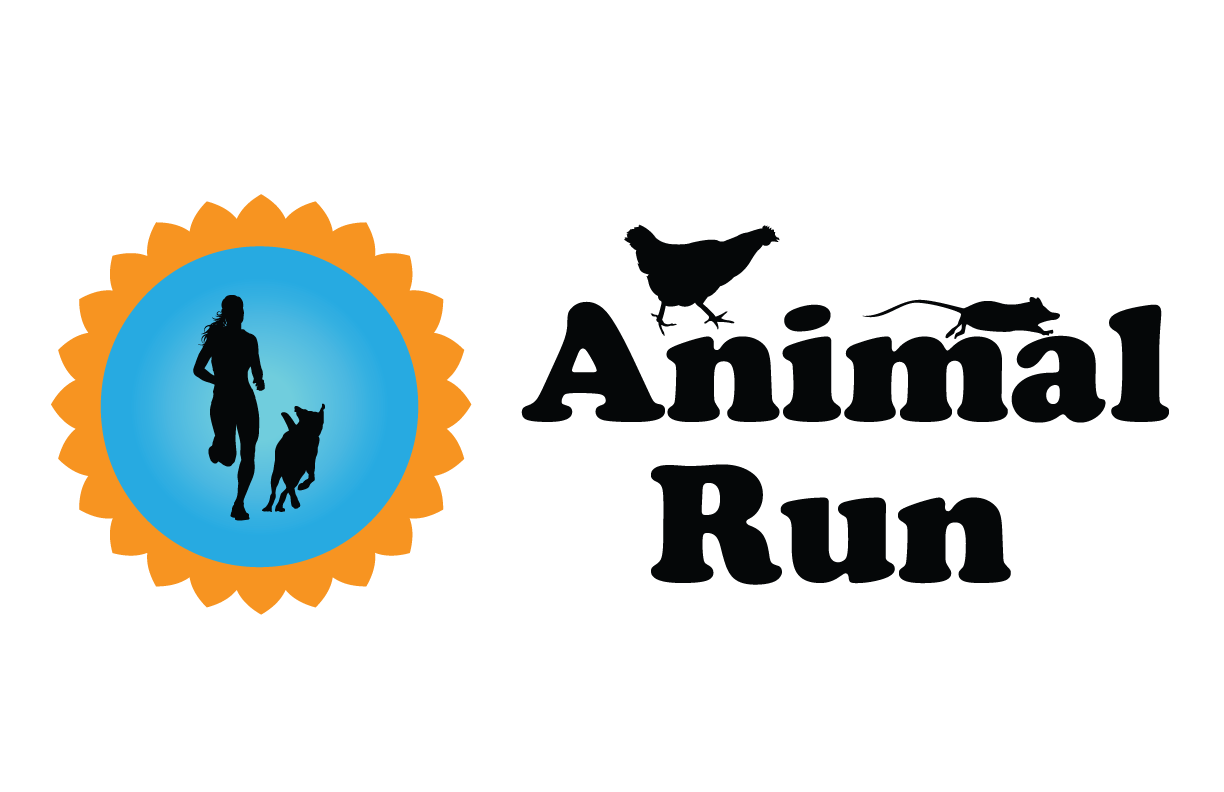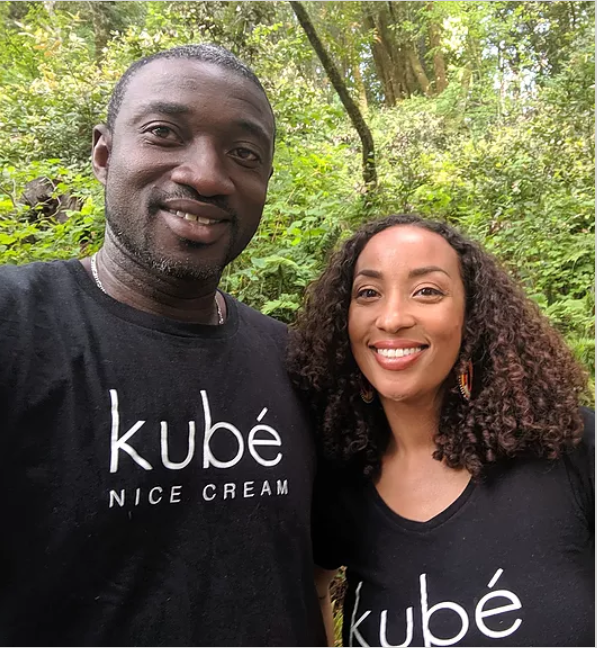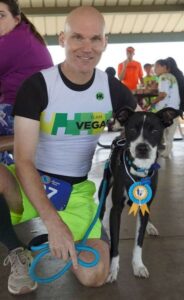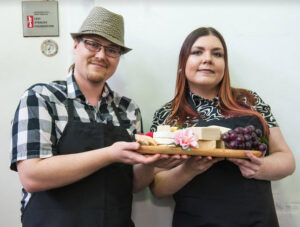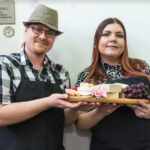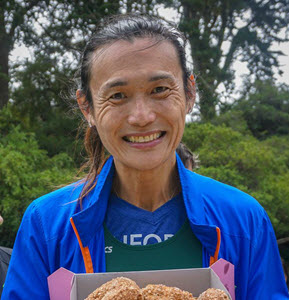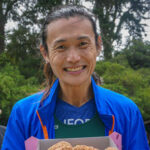kubé is an Oakland based artisanal nice creamery with a healthy dose of food justice in each delicious scoop. The owners are Kai and Nee-Nueh Nortey.
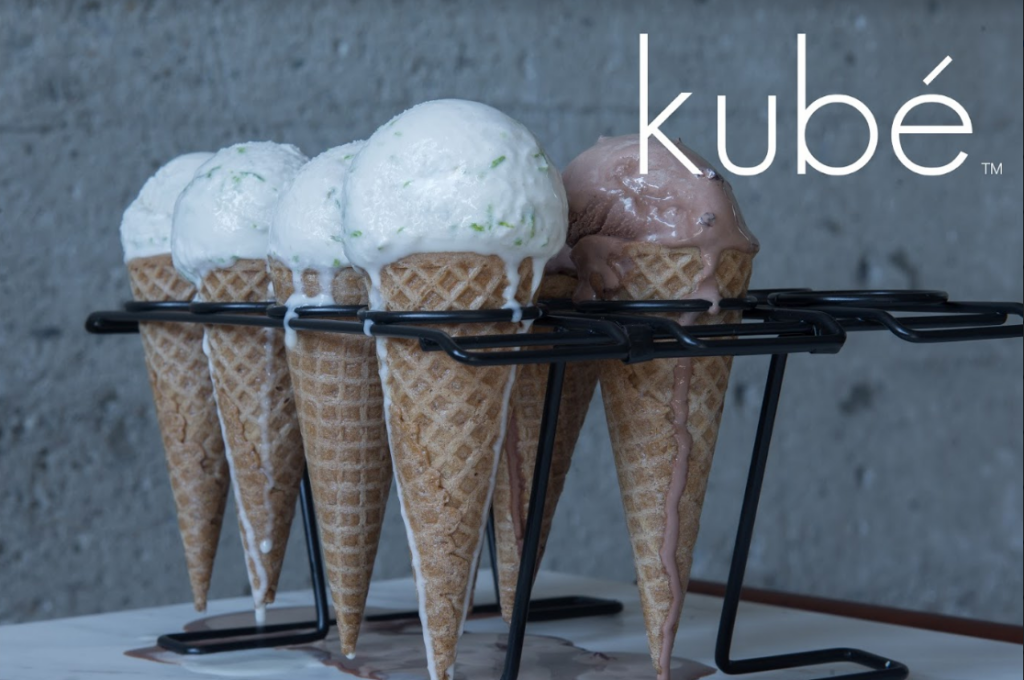
Let’s start with the basics. What’s your background?
I grew up in Oakland and attended Mills College, a private women’s school. My husband Nee-Nueh was born and raised in Winnipeg, Manitoba, Canada and he is Ghanaian-Canadian. I am African-American.
Where did you two meet?
We met back in August 5, 2005, at a networking event in downtown Oakland’s Preservation Park. After our first date, we fell in love and married 4-years later. We have very similar values and discussed creating a future utilizing our various talents and vision. Together we come from an interdisciplinary background in marketing, software technology, communication, biology, art, food science, and restorative justice.
We wanted to leverage our skills to solve social and food justice issues in order to restore value, health, joy, economic equity, racial equity, and gender equity for diverse communities. Almost everything in our current system is broken – so this is a good time for people to WAKE UP and use their life as a force for transformation, toward something they are called to do or are passionate about!
It must be incredibly challenging to start a new business while raising a family.
Yes – it is challenging to raise children while growing a business, but our son gets to learn about the difference between Mama Earth food and seeds versus GMO food and seeds. He learns why some scientists want to prolong the shelf life of packaged food with toxic chemical preservatives.
My son is 7-years old. He is curious and wants the know the truth. We have a lot of engaging discussions on what food justice is and what it looks like – creating new, locally resilient and sustainable food systems without chemicals. My son gets to learn about the engineers who help us design coconut specific equipment which maintains the integrity of food. He also gets to learn about supporting local farmers at our local farmers’ markets, where we purchase organic strawberries.
Our son knows that we use Red Bay Coffee, a local artisan roaster company in Oakland, to make espresso, for our latté nice cream flavor. He also gets excited to help me take our coconut byproducts to the urban farms. It is really beautiful that our son can see a circular economy and we discuss this, a lot. He is learning to respect money, and how we use it for a value of exchange for things we need and for things we want to invest in.
What was the genesis of kubé?
The idea of kubé came from connecting many dots in our lives. Nee-Nueh has lots of food allergies and is lactose intolerant. He is allergic to nuts, fish, soy, and mushrooms. We always cook our meals and grow many of our own organic vegetables from our garden. He cannot eat just any non-dairy ice cream – no cashew or soy ice cream. For me, I became lactose intolerant in my late 20s and had a lot of stomach pains and gas from consuming dairy ice cream.
However, when we went to Ghana to visit family, we ate so much mature coconut, mangos, and pineapples, and I was like … ohhhh Goddess Of The Universe … we are missing this in California!! We need to start buying mature coconuts and eating the fresh fruit from the seed and stop buying that fake stuff, the coconut cream in the can, which has chemicals inside. It is all fake.
I started doing research on mature coconuts and making my own coconut cream, cold-pressing shredded mature coconut fruit and getting amazing coconut cream out and making my own coconut milk. It was delicious and was so creamy with a very mild coconut flavor. We have been deceived by the food industry, because the FDA allows 10-parts per million of sodium metabisuflite, a toxic bleaching chemical preservative to exist in all coconut cream and coconut ice cream products on the market to prolong the shelf life for 5-years.
I called many manufacturers in Thailand and they explained why they use sodium metabisulfite as a preservative. However, I started reading more that scientists know that many people are allergic to sodium metabisulfite and that it causes gastro-intestinal and hormonal issues. The big food industry doesn’t care about people’s health. I knew this, but more evidence was coming out left and right with so many types of foods we normally think are okay.
As a truth seeker and social activist, with a Masters in Marketing Communications and PR, it was clear that my duty was to restore OUR HEALTH and VALUE as people again. I was committed to making the BEST TASTING non-dairy ice cream, without chemical preservatives, artificial colors or flavors. Almost all non-dairy coconut ice cream on the market has added fake, artificial coconut flavoring and it is overly strong and horrible. Most people who taste kubé are shocked that they cannot taste any coconut in our various plant-based flavors. You see, people have never had real, cold-pressed coconut cream without chemical preservatives unless people in their culture make it.
Once we add in fresh squeezed key lime, strawberries, unsweetened dark chocolate, or espresso, people are surprised that they taste only clean, fresh, and bold plant-based flavors.
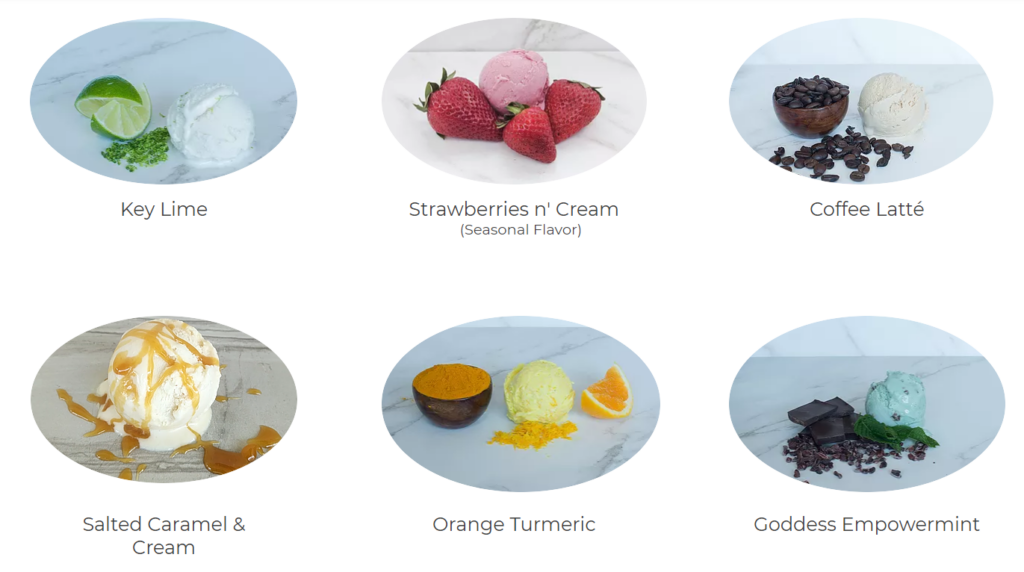
Is it the cold-pressing technique that suppresses the coconut flavor?
Fresh mature coconut cream simply does not have a strong coconut flavor. The funny thing is those who love coconut have requested a “coconut flavored” kubé nice cream. So we will add in fresh shreds of coconut in the cold-pressed coconut cream. This is where all the flavor is; inside the fiber. It is really good! It is authentic and not a fake coconut flavor. People will love it! Look out for it later this year.
Why do you call it “nice” cream vs “ice” cream?
First, kubé means “coconut” in the Twi language from Ghana, where I got really inspired to eat more coconuts, because they are everywhere in Ghana. I have always loved the flavor of coconut. When I was a child, I would always ask my mom to make a coconut cake for my birthday. I didn’t have my first mature coconut until I went to Ghana, West Africa. Upon returning home, I learned more about the health benefits of lauric and caprylic acids that are anti-fungal, anti-viral, and anti-bacterial.
We call it “kubé nice cream,” because kubé is “nice” to the belly and your waistline. Because our nice cream does not contain sodium metabisulfite or dairy, it will not cause gastro-intestinal issues. kubé nice cream (cold-pressed, raw coconut ice cream) is the best plant-based fat which your liver readily metabolizes to provide energy to your cells. You will not gain weight from coconut cream and there is no cholesterol.
Vegans would call it nice cream because no animals were harmed since there is no dairy.
There is some confusion on what “nice cream” means. It refers to a non-dairy frozen dessert that is made out of various fruits and nuts, oats, soy or coconut cream. It is true that while no animals were harmed to make nice cream, there are certainly people being harmed during the production of the coconut cream in other countries. In Asia and India many companies are paying women and men super low wages to manually de-shell coconuts and work on an assembly line. Through my research, many people are injured on the job and exploited for their labor.
In addition, many coconut farmers in the Caribbean are not being fairly compensated for their coconuts or given access to the international coconut markets. We plan to change this by working directly with coconut farmers and paying them fair trade prices or higher. We have been in discussions with a women cooperative coconut farm in Mexico, and will need to visit soon.

Chocolate comes to mind too. Unless it is fair-trade chocolate, slave labor is most likely used to produce chocolate for bars, chips, cocoa and nice creams.
This is why it is important to create a socially conscious business that addresses many of these issues. We are currently buying fair trade, organic TCHO chocolate and are still exploring other small cooperative owned chocolate farms through other distributors. This is what we do daily; making purposeful decisions that positively impact the future!
More people have to know the social and economic issues and choose to be a part of the solution. This is where historical analysis, evolved human consciousness, compassion, and new thought leadership all converge. It is such a process, because all the good doesn’t happen at one time.
What you do with all your coconut waste? There must be a ton of it.
Yes, we have a lot of coconut byproducts like the coconut shells and coconut shreds. We give it to PlantingJustice.org to create compost and use for their urban, organic gardens for growing food to sell. PlantingJustice.org hires formerly incarcerated men and women to learn permaculture skills to manage a farm and sell food to community members at farmers’ markets. I am inspired by Planting Justice because they provide living wage jobs with health insurance to people coming back to society.
This is how we are building a full circle regenerative business and economy that focuses on restorative economics, equity, and ecology. Our byproducts help to grow more food for urban gardens. This is the definition of regenerative.
What’s your greatest business challenge right now?
Our biggest challenge is supplying customer demand. Customers want to order kubé but we are limited by our current commercial kitchen. We need a new space to rent! We share a commercial kitchen in Oakland from a caterer and it is too expensive. We can only use the current commercial kitchen on the weekends and on some week nights. We have to store our equipment there which incur extra fees. There seems to be a shortage of commercial kitchens in Oakland, Berkeley, and Hayward. We need our own commercial kitchen so that we can make product all day to supply the demand.
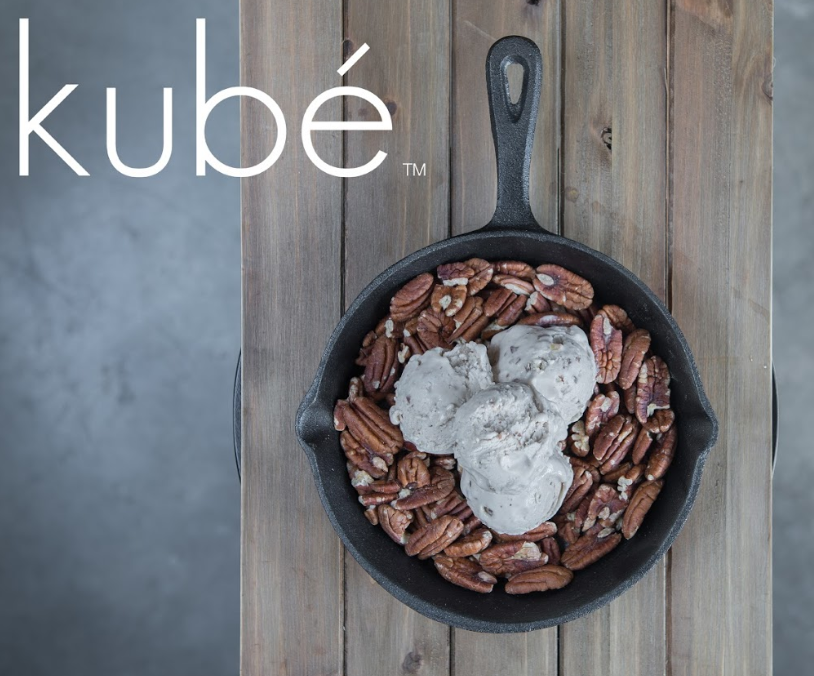
Then what happens next?
Once we find our own commercial kitchen for kubé, we will hire formerly incarcerated women who are survivors of sexual abuse and human trafficking to restore their humanity and provide meaningful work for their economic needs. Did you know that women are the fastest growing population in prison? Eighty percent of women in prison are there due to being victims and survivors of sexual abuse, domestic violence, and human trafficking. Due to social inequalities and institutionalized racism, many people have been wrongly convicted and abused by the system of mass incarceration.
Formerly incarcerated people will need the support of purpose-driven businesses that believe in personal and professional transformation and that inspire their staff to grow beyond their past experiences. Unfortunately, most employers do not hire formerly incarcerated folks, due to misconception, fear, and bias. However, formerly incarcerated folks need new opportunities because they have been stripped of their dignity. They want to participate in society in a healthy way. Statistics show that formerly incarcerated folks are committed and loyal employees, who want to restore their value to society and to their families.
I can’t wait to build our kubé team of women. As Beyoncé says, “Ladies, let’s get in formation.” To me, this means informing and organizing ourselves, as women, to build new systems of accountability that restore our value and dignity back to ourselves and to diverse communities. We need new systems that are accountable to the actual needs of people, animals, and the environment.
I’m a social activist who has worked in juvenile justice rehabilitation services. I worked with youth on probation and connected them to healthy resources that they needed. In particular, In 2002, I taught high school students how to become youth attorneys for their peers, and took teen-aged girls on probation to a field trip at McCullum Youth Court to become “youth jurors” for their peers, in trouble with the law. The youth jurors had decision-making power, to develop a rehabilitative sentence for their peers. The teenage girls on probation loved being able to participate as youth jurors and knew that transformation and growth is a necessary part of life with the right tools. I also used to work at Ella Baker Center For Human Rights, Burns Institute for Juvenile Justice and Fairness, and National Council on Crime and Delinquency.
I have been working against mass incarceration (a legal extension of the institution of slavery in the US), and I believe building a business that welcomes people back into society through meaningful work and positive relationships is very powerful.
Wow! Your product is not just nice cream … that’s for certain.
Here’s what is on our website: Kai defines food justice as the right to know what ingredients are in your food, the right to determine new, healthier food systems, and the right to determine healthier outcomes for people, animals, and Mama Earth.
In essence, kubé is healthy liberation. kubé is fun, inspiring, and transformative like the coconut! No other ice cream brand has a full circle regenerative model like us. kubé is leading the way!
You can purchase amazing delicious kubé nice cream at the 2nd Annual Animal Run at Point Pinole on July 21st. Register here: https://animalrun.us/race-details

